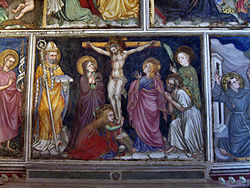Jacopo de Voragine
| Blessed Jacobus da Varagine | |
|---|---|

Jacobus da Varagine with the Golden Legend in his hand, fresco by Ottaviano Nelli, chapel of Trinci Palace, Foligno, Italy
|
|
| Born | c. 1230 Varagine (present-day Varazze), Liguria |
| Died | July 13 or July 16, 1298 or 1299 Genoa |
| Venerated in | Roman Catholic Church |
| Beatified | 1816, Genoa by Pius VII |
Jacopo De Fazio, best known as the blessed Jacobus da Varagine (Italian: Giacomo da Varazze, Jacopo da Varazze; c. 1230 – July 13 or July 16, 1298) was an Italian chronicler and archbishop of Genoa. He was the author, or more accurately the compiler, of Legenda Aurea, the Golden Legend, a collection of the legendary lives of the greater saints of the medieval church that was one of the most popular religious works of the Middle Ages.
Jacobus was born in Varagine (Varazze), on the Ligurian coast between Savona and Genoa. He entered the Dominican order in 1244, and became the prior at Como, Bologna and Asti in succession. Besides preaching with success in many parts of Italy, he also taught in the schools of his own fraternity. He was provincial of Lombardy from 1267 till 1286, when he was removed at the meeting of the order in Paris. He also represented his own province at the councils of Lucca (1288) and Ferrara (1290). On the last occasion he was one of the four delegates charged with signifying Pope Nicholas IV's desire for the deposition of Munio de Zamora - who had been master of the Dominican order from 1285 and was eventually deprived of his office by a papal bull dated April 12, 1291.
In 1288 Nicholas empowered him to absolve the people of Genoa for their offence in aiding the Sicilians against Charles II. Early in 1292 the same pope, himself a Franciscan, summoned Jacobus to Rome, intending to consecrate him archbishop of Genoa. Jacobus reached Rome on Palm Sunday (March 30), only to find his patron ill of a deadly sickness, from which he died on Good Friday (April 4). The cardinals, however, propter honorem Communis Januae ("for the honor of the commune of Genoa"), determined to carry out this consecration on the Sunday after Easter. He was a good bishop, and especially distinguished himself by his efforts to appease the civil discords of Genoa among Guelfs and Ghibellines. A story, mentioned by Echard as unworthy of credit, makes Pope Boniface VIII, on the first day of Lent, cast the ashes in the archbishop's eyes instead of on his head, with the words, "Remember that thou art a Ghibelline, and with thy fellow Ghibellines wilt return to naught."
...
Wikipedia
